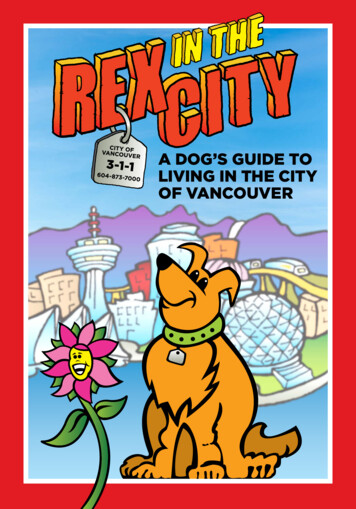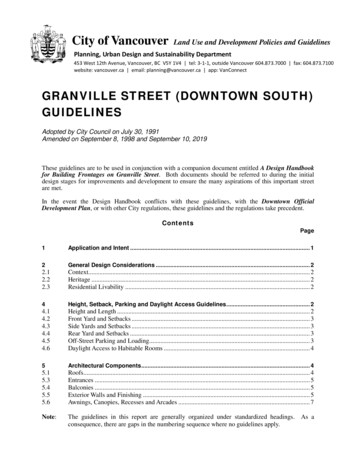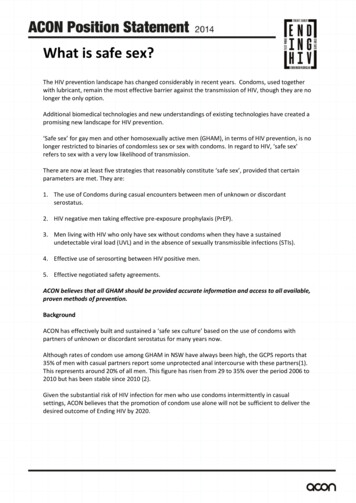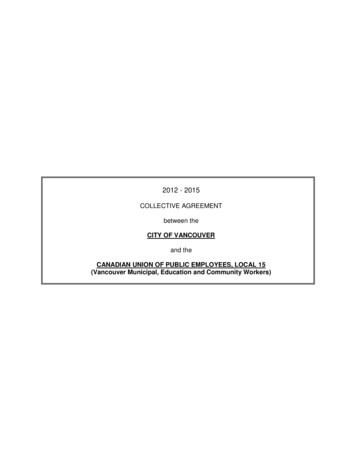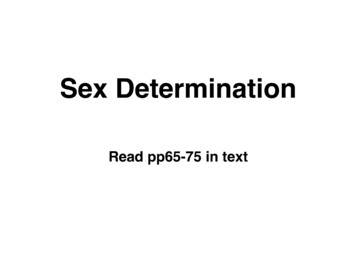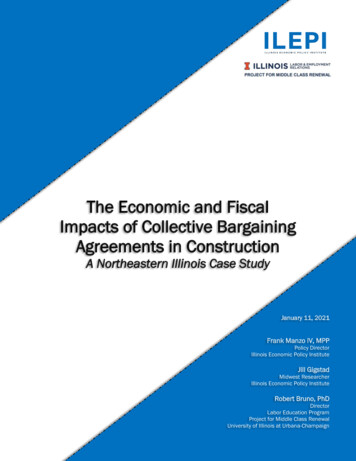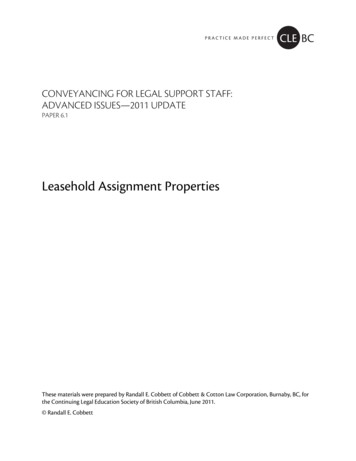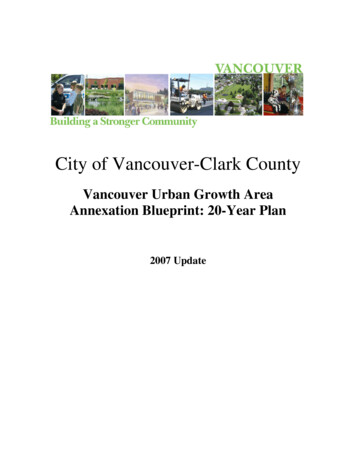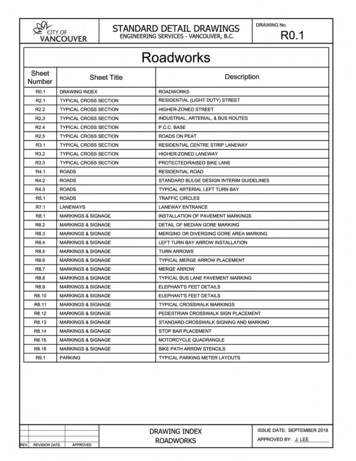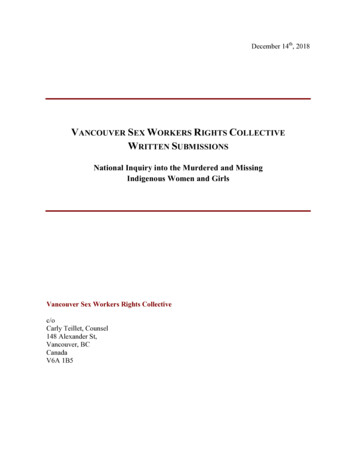
Transcription
December 14th, 2018VANCOUVER SEX WORKERS RIGHTS COLLECTIVEWRITTEN SUBMISSIONSNational Inquiry into the Murdered and MissingIndigenous Women and GirlsVancouver Sex Workers Rights Collectivec/oCarly Teillet, Counsel148 Alexander St,Vancouver, BCCanadaV6A 1B5
TABLE OF CONTENTSINTRODUCTION . 2VANCOUVER SEX WORKERS RIGHTS COLLECTIVE . 3CONTEXT: THE LENS FOR THE INQUIRY . 4A. LANGUAGE, INCLUSION AND ACCEPTANCE . 5B. PROVIDING SEXUAL SERVICES . 6C. HUMAN TRAFFICKING FRAMEWORK . 8D. STIGMA OF SEX WORK . 10E. RESPECT FOR THE WHOLE PERSON . 12F. IMPORTANCE OF VOICES . 13G. CHALLENGES TO BEING HEARD . 14RECOMMENDATIONS . 18INCLUDE AND RESPECT OUR VOICES . 18POLICE MUST RECOGNIZE OUR RIGHT TO BE SAFE AND FREE FROM VIOLENCE . 19PROVIDE SAFE SPACES AND HOUSING NOW . 23FUND OUR VISION OF SUPPORT AND SERVICES . 26OUR FAMILIES DESERVE HEALING AND SUPPORT, NOT DISRUPTION . 32LISTEN TO OUR TEACHINGS . 34THE LAW MUST NOT DEPRIVE US OF SAFETY . 37IMPLEMENTATION . 40CONCLUSION . 411
INTRODUCTION1. The Vancouver Sex Workers Rights Collective [the “Collective”] is a diverse collective ofIndigenous individuals who participate or participated in sex work or trade or providesexual services in the Downtown Eastside of Vancouver. We are represented in the NationalInquiry into Murdered and Missing Indigenous Women and Girls [the “National Inquiry”]by a collective of four organizations: Providing Advocacy Counselling & Education[“PACE”], WISH Drop-in Centre Society [“WISH”], Sex Workers United AgainstViolence Society [“SWUAV”] and Pivot Legal Society.2. The Collective works to amplify the voices of Indigenous peoples who self-identify as cis,trans, two-spirit women and individuals from diverse gender identities and sexualorientations who participate or have participated in sex work or provide sexual services.Collective members share their stories in keeping with the diverse Indigenous traditions ofthe Collective and the Inquiry’s mandate to be respectful of Indigenous legal principles andpractices. . As was indicated during the Collective’s oral submissions to the NationalInquiry, sex workers are knowledge keepers of their own experiences. As with theCollective’s oral submissions, the written submission to the National Inquiry will beanimated by the voices and stories of the Collective’s members.3. WE acknowledge that the National Inquiry has held hearings and gathering throughout whatis now Canada on the traditional territories of many Indigenous Nations.WE acknowledge and honour those Nations, their sovereignty, and their self-determination.WE acknowledge and honour the spirits of our stolen sisters, survivors, and families.WE are the experts.WE are the voices that need to be heard.WE offer important knowledge and stress the urgency of our recommendations.WE submit the following written submissions in the hope that our voices will be given fullconsideration in the National Inquiry’s findings and final report.2
VANCOUVER SEX WORKERS RIGHTS COLLECTIVE4. WE are Indigenous trans and cis women, and individuals from diverse gender identities andsexual orientations who participate or have participated in sex work or provide sexualservices and four organizations that provide services to individuals who participate in sexwork or trade in Vancouver, British Columbia.5. PACE is a peer-driven society that seeks to reduce the harm and isolation associated withSex Work through education, support, and advocacy. PACE works to increase the health,safety, and empowerment of its members, by respecting members’ rights to selfdetermination and supporting their self-identified needs. PACE provides violenceprevention workshops and a range of individual and group peer-run supports for cisgender,transgender, and two-spirit sex workers, including a weekly Aboriginal Sharing Circle.6. About 55% of the members of PACE report having Indigenous ancestry. Approximately 30- 35% of members identify as trans, non-binary, two-spirit, or gender diverse; 90% useshe/her pronouns, 6% use they/them, and 2.5% use he/him. The most common areas ofsupport sought by members in one-on-one support services are (in order): emotionalsupport, housing, financial, medical, advocacy, safety, financial, sexual assault, violence,legal, mental health, and support around trauma.7. WISH aims to improve the health, safety and well-being of self-identified adult women whoare involved in the street-based sex trade and has provided direct services to sex workers inthe Downtown Eastside since 1984. WISH has operated a drop-in centre since 2008, whichnow provides overnight services, including food, clothing, emergency and medical referrals.WISH also operates the Mobile Access Project (MAP) Van, conducting outreach to streetbased sex workers throughout Vancouver. WISH convenes the Aboriginal Health andSafety Project to provide opportunities for women who do sex work to connect with theirculture.8. The WISH drop-in centre serves approximately 115 breakfasts, 120 dinners and as many as90 midnight meals a day, 365 days a year. In the last year the number of women taking3
midnight meals increased from 20 to 90 meals served daily. The self-identified women whouse the drop-in represent the full spectrum of involvement in sex work or trade, fromnightly activity to individuals who have largely exited but maintain one long standingclient. The mean age of individuals who use the drop-in is 45 years old. The MAP vanprovides food and services to self-identified women who are actively engaged in streetbased sex work. Their median age is 38 years old. Over 80% of women who use WISH arehomeless or inadequately, inappropriately or unsafely housed. Sixty % of them self-identifyas Indigenous, 25 % as LGBTQ and 20% as trans or two spirited individuals.9. SWUAV is a peer-based organization of current and former sex workers in the DowntownEastside who engage in advocacy and peer street-based outreach. SWUAV’s Board ofDirectors is and has always been composed predominantly of Indigenous cisgender andtransgender women. SWUAV has been involved in two Supreme Court of Canada caseschallenging the constitutionality of the laws on sex work: as a plaintiff in Canada (AttorneyGeneral) v SWUAV, 2012 SCC 45 [SWUAV v Canada] and as an intervenor in Canada(Attorney General) v Bedford, 2013 SCC 72 [Bedford].10. Pivot Legal Society is a non-profit organization founded in 2002 in Vancouver’s DowntownEastside that works on behalf of marginalized communities to create a just, fair, and equalsociety through strategic litigation, law reform, legal research, and public education. PivotLegal Society represented SWUAV in SWUAV v Canada, and was part of an intervenorcoalition with PACE and SWUAV in Bedford, a decision that invalidated three of Canada’scriminal laws regulating sex work.CONTEXT: THE LENS FOR THE INQUIRY11. The report and recommendations of the National Inquiry must reflect and honour thediversity of experiences and identities of murdered and missing Indigenous women andgirls including gender diverse individuals, survivors and family members. The NationalInquiry must avoid further perpetuating the colonial systems, concepts and power structuresthat have contributed to and caused violence, murder or disappearance of Indigenouswomen, girls and individuals of diverse gender identities and sexual orientations.4
12. The National Inquiry must recognize self-determination, self identification and choice of allIndigenous peoples, whose diversity of experiences, stories and truths must not be erased orconflated into a single narrative. We urge the National Inquiry to respect the diversity andbeauty of different Indigenous nations, cultures and traditions as well as diverse sexualorientations, gender identities and choices. We urge the National Inquiry to accept that thechoice to sell or trade sex can be exercised in a manner that is non-exploitative and a matterof personal sovereignty and jurisdiction.A. Language, Inclusion and Acceptance13. Language is important and powerful. It is crucial that the diversity of sexual orientations,gender identity, continuum of choice and varied experiences of sex work are respected andhonoured in the language we use. We urge the National Inquiry to be deliberate in the termsthey use throughout their report and recommendations. It is important for the NationalInquiry to avoid erasing or imposing judgment on an individual’s truth and circumstances,and the Inquiry must not place further colonial interpretations and stereotypes collectivelyon Indigenous peoples who engage in sex work. Rather the National Inquiry must preserveand refer to an individual and collectives who sell or trade sex in the manner they describethemselves, including as having autonomy in their decision to engage in sex work.14. In this document we use the terms that are used by members of the Collective as they referto themselves. We define “Indigenous” to include Inuit, Métis and First Nations. Weacknowledge and honour a spectrum of gender identities and define the term “genderidentities” to include trans and cis women, two spirit, non-binary and gender fluidindividuals, as well as any other gender identities we have not included here. We recognizea continuum and a diversity of sexual identities and define the term “sexual orientations” toinclude lesbian, gay, bisexual, asexual, pansexual and queer individuals, as well as anyother sexual orientations we have not included here.5
B. Providing Sexual Services15. We envision a future where all individuals who participate in sex work are free from therisk of violence, discrimination, social stigma, and harms, so they may enjoy the samerights as all other Canadian citizens including the rights to life, liberty, security of theperson, and equal protection under the law.116. Governments, service providers, Indigenous organizations and individuals must make longterm commitments to social change. This change is urgently needed to eradicate systemicissues that create disproportionate levels of poverty, homelessness, health concerns, andsubstance use within the Sex Work community. Change is urgently needed so thatindividuals can make safe, healthy, and informed decisions in their lives.17. Sex work defined broadly includes any erotic, intimate, or sexual activities performed inexchange for material consideration, including to meet basic needs. Sex work includesescorting, street based sex work, cam work, cyber sex, exotic dancing, pornography andmore. Selling sexual services is not illegal in Canada. Many activities associated with sexwork or trade are illegal resulting in the criminalization of individuals who participate.18. The National Inquiry must respect how individuals self identify and take care to use termsthat celebrate a whole person and diversity of experiences and identities. As such we urgethe National Inquiry to adopt the terms of “individuals who provide sexual services” or“individuals who participate in sex work or trade.” Indigenous women and individuals ofdiverse gender identities and sexual orientations participate in sex work or trade for diverseand personal reasons.19. No person should be reduced to a single aspect of their life, their job or the violence theyhave experienced. The National Inquiry must not pin the identity of Indigenous women to apoint in time. If an individual was sexually exploited or assaulted as a youth, they must notbe reduced to that experience, in the same way that Indigenous women who areremembered and cherished by family members who have spoken to this National Inquiry1PACE Society, “Vision” (12 December, 2018), online: ry/ 6
must not be reduced to the violence that ended their lives. The National Inquiry must notstate that a person who has experienced violence at one point is unable to make choices.20. Indigenous women and individuals of diverse gender identities and sexual orientations holdbodily self-determination, autonomy and choice. The National Inquiry must not assault thetruths, experience or bodies of Indigenous women by negating or erasing their capacity toconsent or to choose. The concept of choice for all Indigenous peoples exists within thestructures of colonialism. Ongoing colonization has marginalized, erased and normalizedpoverty and extreme violence against Indigenous women, girls and individuals of diversesexual orientations and gender identities leading to situations where there are sometimesfew choices available to them. Indigenous women and girls have and continue to resistpoverty, homelessness, inadequate provision for their thriving families and violence.Resistance, survival, and prospering in the face of colonial systemic and direct violence is achoice, and sex work can be chosen in this context.21. There is a spectrum or continuum of choice and sexual exchange. On the side of full choiceis the exchange of sexual acts for pleasure and/or for consent given freely. On the side ofno or limited choice is trafficking. On the spectrum exist: sex work, sexual exchange forstatus or power, sexual exchange for necessities (food, drugs, shelter etc.), sexualexploitation and assault.22. An Indigenous woman can be assaulted, raped or murdered in any setting, in her home, atgatherings, work, walking down a street. A family member, acquaintance, service provider,police officer, employer, customer, client or date could target her. A person cannot revoketheir human right to live free from violence, and cannot legitimize or invite violence ormurder, including by providing sexual services or participating in sex work or trade.2 Sexwork itself is not a key risk factor for violence; colonization is the key factor.32Transcript, Cross examination of Jacqueline Hansen, Amnesty International Canada: “Criminal Justice Oversightand Alternative Programs,” Quebec City, Mixed Part II & III Volume VI at pg. 236 -7; Transcript, Crossexamination of Dr. Renée Brassard “Criminal Justice Oversight and Alternative Programs,” Quebec City, MixedPart II & III Volume VIII at pg. 176-1773Barkaskas, Patricia and Hunt, Sarah Access to Justice for Indigenous Adult Victims of Sexual Assault For theDepartment of Justice (October 2017) online: https://ubc.academia.edu/SarahHunt pg. 167
C. Human Trafficking Framework23. Responses to human trafficking should be understood as one legal response among many toviolence against Indigenous women. Unfortunately, human trafficking is presently theprimary framework under which state authorities conflate multiple types of violence, sexualexploitation, child exploitation and adult sex work. Imposing the singular framework oftrafficking onto all cases of murdered, missing or victimized Indigenous women and girls“serve(s) only to diminish and hide what we know to be true about their experiences.”424. The use by academics, activists, the media and governments of human trafficking as theframework or lens through which responses to murdered and missing Indigenous womenand girls are considered is inappropriate, ineffective and harmful. The focus on humantrafficking shifts attention away from the systemic colonial factors that created and maintainthe circumstances and structures of violence. This approach focuses resources andresponses to violence into increased policing and away from programs and services thatmay help individuals that are facing specific types of violence that are conflated into humantrafficking (child exploitation, sexual exploitation or violence experienced whenparticipating in sex work). Police attention on individuals who participate in sex workreclassified as victims in the human trafficking framework puts these individual at risk.25. The sex work community has expressed the harms of imposing a human traffickingframework in the context of the Ontario police Operation Northern Spotlight.5 Theexperience with Operation Northern Spotlight, and its increased police interference andsurveillance in the lives of people participating in sex work, “compromise[d] their safetyand dignity” and “undermined sex workers’ health and safety.”6 Assistant CommissionerJoanne Crampton of the Royal Canadian Mounted police, responsible for Federal Policing4Hunt, Sara “Representing Colonial Violence: trafficking, sex work and the violence of laws” Atlantis 37.2 (1),2015/2016 online:http://journals.msvu.ca/index.php?journal atlantis&page article&op view&path%5B%5D 3042 pg. 32 citingNative Women’s Association of Canada (2010) What their stories tell us: Research Findings From the Sisters inSpirit Initiative. Ottawa, ON: Native Women’s Association of Canada5Canadian alliance for sex work law reform press release “Turn off the spotlight: Sex workers ad allies urge amend to operation Northern Spotlight” online: /Cross-CanadaLetter.pdf 6Ibid.8
Criminal Operations including human trafficking, testified at the St. John’s Newfoundlandhearing. She indicated that RCMP policy is to ensure that interactions with individuals whocome to their attention does not cause them further harm. However, she reported no specificpolicy or training for interacting with Indigenous women and girls who are potentiallybeing trafficked, and no policy that detailed how police would uphold a woman’s dignitythrough specific steps such as making sure she was clothed.726. Assistant Commissioner Crampton painted a dire picture of domestic trafficking becomingmore and more prevalent in Canada and noted that young Indigenous women and girls wereparticularly vulnerable. Later she confirmed that she was not able to provide information onhow many of the 6 individuals removed under Northern Spotlight in 2017, or the 324individuals identified as being at risk of human trafficking were Indigenous. She reported “Iwouldn’t have accurate information on that.”8 This suggests that Indigenous women andgirls may not have been a priority of Northern Spotlight or the claim a human traffickingcrisis in which indigenous women and girls are overrepresented cannot be substantiated.27. The human trafficking framework erases the experiences and stories of individuals byimposing the narrative of victimhood. The National Inquiry must not position Indigenouswomen and girls as helpless victims that need to be saved. Rather the National Inquirymust respect and honour their agency, self-determination and strength. Unless anindividual who participates in sex work or provides sexual services self identifies as avictim they should not be labeled as such. Labeling a person a victim when they do notidentify as such is a perpetuation of the paternalism, racism, and sexism of colonialism.Doing so denies the personal autonomy of individuals over their bodies and the decisionsthey make about what they do with their bodies.28. Activists, Governments and bodies, including Indigenous women’s organizations, whowish to abolish prostitution have adopted the human trafficking framework imposing7Transcript Assistant Commissioner Joanne Crampton “Sexual Exploitation, Human Trafficking and SexualAssault” St. John’s Mixed Part II & III Volume XV at pg. 289-908Transcript Assistant Commissioner Joanne Crampton “Sexual Exploitation, Human Trafficking and SexualAssault” St. John’s Mixed Part II & III Volume XV at pg. 2879
“victimhood” on all individuals who participate in sex work. Indigenous women and girlswho participate in sex work cannot and must not be seen as a monolithic group; they havea diversity of experiences, backgrounds journeys, and reasons for entering sex work.People who sell or trade sex cannot be simply understood as items of sexual trafficking –their bodies reduced to objects and their free will erased. People involved in the sex tradeare not part of a monolithic group. They do not describe their experience as purelyvictimization, and their voices cannot be disregarded. Their feelings, opinions, thoughts,and responses to sex work are diverse, multiple, and unique, and any attempt to reducetheir agency and complexity is an imposition of colonial paternalism, racism, and sexism.29. Perceiving Indigenous cis and trans women through the lens of human trafficking and asvictims erases their lives. Dr. Sarah Hunt notes:The continuum of violence, state neglect, and silencing they facedleading up to their deaths or disappearances remain invisible,facilitated in part by the criminalization of their lives as sex workersand drug users. Constructed as belonging to degenerate spaces, suchas the Downtown Eastside or the reserve, Indigenous sex workersfail to matter until after they are dead and can be taken up as one of‘the missing women,’ at which point their agency is no longer inquestion and others are needed to speak for them. Interrupting thischaracterization of Indigenous people who trade or sell sex requiresupholding and enhancing their agency and voice while they are stillalive, rather than rendering them as pure victims.9D. Stigma of Sex Work30. Individuals who participate in sex work or provide sexual services constantly encounterand have to overcome stigma. Stigma manifests in individual, social, societal,governmental, and criminal responses and is grounded in stereotype and racism. It operatesso that individuals are blamed for their own victimization, mistreated, dismissed,criminalized, ignored and erased.10Social stigma against sex work creates particular needs for sex workers9Hunt, Sara “Representing Colonial Violence” at pg. 34Barkaskas, Patricia and Hunt, Sarah Access to Justice for Indigenous Adult Victims of Sexual Assault For theDepartment of Justice (October 2017) online: https://ubc.academia.edu/SarahHunt pg. 26 and 27; Transcript Dr. Janet Smylie, “Colonial Violence”, Iqaluit, Part II&III, Vol III, p 85; Transcript,Jasmine Redfern, “Colonial Violence”, Iqaluit, Part II&III, Vol IV, p 1351010
of all genders who have experienced sexual violence, both historic andrecent, as a “discourse of disposal” (Comack and Seshia 2010) renderssex workers at greater risk of violence and of having the violence nottaken seriously. [ ] The prevalence of sexual violence againstIndigenous sex workers demands that “we pay attention to the role ofpublic discourse in perpetuating this ‘othering’ process” (Comack andSeshia 2010) such that Indigenous sex workers can disclose incidents ofviolence without facing further discrimination.1131. A human trafficking framework reinforces the belief that “no one would choose” toparticipate in sex work, and that, conversely, if choice does exist, individuals whoparticipate in sex work are to blame for the violence they experience due to their “high risklifestyle.” The human trafficking paradigm gives rise to the “worthy victim,” someone whois worth saving only if they recognize that sex work was not a choice. Worthiness isequated to victimhood and the desire to be saved, which is only narrowly understood as theneed to exit the sex trade. Imposition of “victimhood” fails to recognize a person’sresistance and their choices, and fails to treat individuals with dignity.32. A human trafficking framework further discourages women from reporting violence thatthey experience as a result of selling or trading sex precisely because instead of beingprovided supports addressing the actual violence, they are instead victimized. If they donot accept the victimization projected onto them they are stigmatized and blamed for theviolence they experience. As a result of mapping a human trafficking framework onto allsex work, Indigenous sex workers are further marginalized. The fear of being blamed andunsupported increases the likelihood that Indigenous peoples engaged in sex work will notreport violence to state authorities or institutions.33. WE submit that the human trafficking framework is harming Indigenous individuals whoparticipate in sex work or provide sexual services and is not helping us to avoid harm orlive and work safely.1211Barkaskas, Patricia and Hunt, Sarah Access to Justice for Indigenous Adult Victims of Sexual Assault For theDepartment of Justice (October 2017) online: https://ubc.academia.edu/SarahHunt (pg.28)12Transcript examination in Chief, Lanna Moon Perrin “Sexual Exploitation, Human Trafficking and SexualAssault” St. John’s Mixed Part II & III Volume XVII at pg. 87-8811
34. WE call on the National Inquiry to reject the blunt and non-nuanced human traffickingframework as the only lens through which to view sex work, with the effect of viewing allIndigenous people who engage in sex work as victims.WE ask the National Inquiry to listen to our voices and hear us when we say that we arenot all victims and that without changes to the current criminalization of sex trade,especially as framed through a human trafficking framework, we will continue toexperience violence that we do not feel safe to report and that may lead to more murdersand disappearances.E. Respect for the whole person35. Individuals who participate in sex work or provide sexual services must be respected aswhole complicated diverse people. The National Inquiry was tasked with investigating theroot causes of the murder and disappearance of Indigenous women and girls. The NationalInquiry’s report must not serve as a mechanism to formally recognize Indigenous bodies“as spaces of expected violence” further normalizing the everyday violence of colonialismand embedding it deeper within Indigenous and settler communities.13 As Lanna MoonPerrin urged in her testimony at the National Inquiry hearings in Newfoundland, we muststop constantly telling our children and the world that we are victims that we are definedby the violence that we experience.14 As Dr. Wade stressed at the National Inquiryhearings in Winnipeg, the National Inquiry’s report must recognize the resistance toviolence, and the dignity of Indigenous individuals.1536. Dr. Sarah Hunt notes: “Representing Indigenous girls and women purely as victims in needof government or legal help in order to ‘save’ or ‘protect’ us does nothing to dislodge the13Holmes, Cindy, Sarah Hunt, and Amy Piedalue. 2015. “Violence, Colonialism and Space: Towards aDecolonizing Dialogue”. ACME: An International Journal for Critical Geographies 14 (2), 539-70 at pg. 550online: e/view/1102 14Transcript, Lanna Moon Perrin: “Sexual Exploitation,” St. John’s Newfoundland, Mixed Part II & III VolumeXVII at pg 9015Transcript, Cross examination of Dr. Allan Wade: “Criminal Justice Oversight and Alternative Programs,”Winnipeg, Mixed Part II & III Volume XIV at pg. 16312
colonial relations in which our victimization has become normalized.”16 Instead, we submitthat the National Inquiry must acknowledge the ways colonial discourses are challengedand rebelled against. The complicated lives of sex workers must be recognized. As Huntpoints out, “We are cultural knowledge keepers, dancers and singers, students, and in manyother ways, vital members of our communities.”17 The richness of Indigenous sex workers’identities are lost in the narrative of victimhood produced, reproduced, and maintained inthe trafficking framework.37. Indigenous individuals of diverse gender identities and sexual orientations who participatein sex work or provide sexual services cannot and should not be reduced to the violencethey experience as a result of choices they make or their jobs. For example, the Indigenousself-identified women who use the services provided by WISH want housing, services,health care, treatment for substance use, protection of the police an end to violence, an endto police abuse and harassment.38. We are mothers, daughters, sisters, trans women, matriarchs and knowledge keepers. Weare Two Spirit, and that means so much. We participate and give back to our communities.We engage in every day activities like all human beings. We are courageous, resilient,caring, artistic and intelligent. We deserve love and respect. We are beautiful inside and out.F. Importance Of Voices39. WE submit that our stories build a strong foundation for supporting changes to perceptionsof sex work in Canada. A strong foundation is necessary to understand what needs tochange to make life safer for Indigenous individuals who participate in sex work or providesexual services. Our voices are ignored. Even when we do tell our stories, Indigenouswomen are not truly
Inquiry, sex workers are knowledge keepers of their own experiences. As with the Collective's oral submissions, the written submission to the National Inquiry will be animated by the voices and stories of the Collective's members. 3. WE acknowledge that the National Inquiry has held hearings and gathering throughout what

